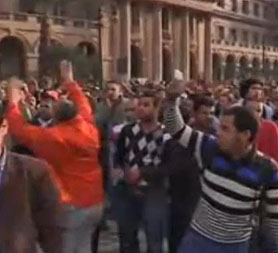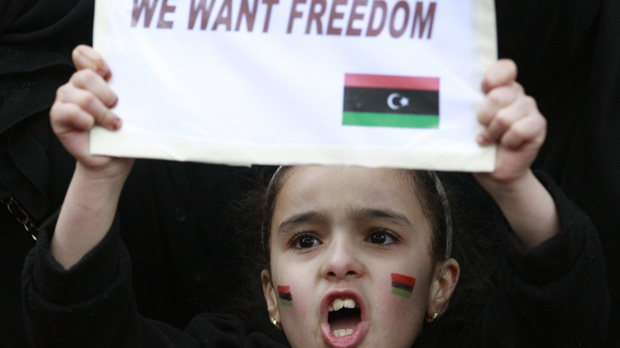Libya: Gaddafi ‘last man standing’ vow as protests spread
Colonel Gaddafi’s son vows the Libyan regime will fight until the “last man standing”, as an engineer in Tripoli tells Channel 4 News the city is shaking.

Gaddafi‘s son, Saif al-Islam, who Libyans refer to as “Dr Saif”, said in an address on state television that the army stood behind his father as a “leader of the battle in Tripoli” and would enforce security at any price. His comments were the first official reaction from the Libyan authorities since the unrest began.
The promise was upheld just hours later as reports came through that fighter planes were attacking the area by air whilst some eye-witness accounts claimed there was ground level shooting as well. There are reports as many as 300 people have now been killed.
Saif accused the international media of exaggerating the number of deaths. He said there were 14 deaths in Tripoli, 84 in Benghazi.
“We will keep fighting until the last man standing, even to the last woman standing … We will not leave Libya to the Italians or the Turks.”
“If everybody is armed, it is civil war, we will kill each other.”
He added: “There are tens of thousands of Libyans who are flocking to Tripoli from all over Libya to defend Tripoli, Libya and Muammar Gaddafi. This is no secret. It is known that there are buses on all coastal roads coming from all Libyan cities.”
Channel 4 News has learnt that land borders between Tunisia and Libya, as well as the border with Egypt, are now closed leaving the country essentially landlocked. Around 3,500 UK and 37 Irish citizens currently reside in Libya. Germany and Greece have already said that they will be sending military planes to recover their nationals but it is not clear whether similar action will be taken by the UK.
Meanwhile, in the UK, it has been reported all employees of the Libyan embassy have resigned and no longer support the Gaddafi regime. This is in addition to the resignation of Justice Minister Mustafa Mohamed Abud el Jeleil, the Libyan ambassador to India Ali al-Essawi, and their representative to the Arab League Abdel Moneim al-Huny.
The UN delegation for Libya told the United Nations that Saif al-Islam’s comments were a ‘statement of war’.
Channel 4 News special report: Arab revolt: Middle East uprisings

Where is Gaddafi?
There are rumours Muammar Gaddafi has already fled Libya, possibly to Venezuela.
Two Libyan fighter jets and two civilian helicopters landed unannounced at Malta Internaional Airport. The two planes were single seater Mirage jets whilst the seven seater helicopters claimed that they were filled with French nationals. Officials were checking their documents to verify these claims.
UK Foreign Secretary William Hague admitted as he had seen some information hinting Colonel Gaddafi was on his way to the South American country.
He told reporters at the European Union Forign Ministers’ meeting: “You asked me earlier about whether Colonel Gaddafi is in Venezuela. I have no information that says he is, but I have seen some information that suggests he is on his way there at the moment.”
Venezuelan President Hugo Chavez denied that the Libyan leader was on his way. The Libyan leader and Chavez have been long-time Allies. Mr Chavez visited Tripoli on a tour last autumn, was guest of honour at Colonel Gaddafi’s 40th anniversary celebrations and even has a football stadium named after him in Libya.
Diplomats claimed that Mr Hague’s comments were based on information from official sources, not just rumours.
But Middle East analyst Geoff Porter said: “He has nowhere to go. He is not Ben Ali, he cannot go to Saudi Arabia.
“There is no option of internal exile like Mubarak in Sharm-el-Sheikh. Possibly the only place he can go is Zimbabwe to hang out with Mugabe.
“So there is no alternative. (If he is pushed from power), he will be like Saddam Husseim and end up hiding in a hole.”
An Irish Foreign Office has told Channel 4 News that planes are currently grounded in Tripoli with expatriates piling into the airport.
EU officials are rumoured to be discussing the possibility of a joint initiative to charter several planes to bring home Europeans based in Libya.
A foreign national engineer living in Tripoli, told Channel 4 News that road systems between the country’s second city, Benghazi, in the east – which has seen the majority of the unrest and violence – and Tripoli were virtually inaccessible.
“It appears that the regime is attempting to isolate, perhaps even enclose, the cities to quickly eradicate the protests,” the engineer said.
“The army, which is, make no mistake, with Gaddafi, is blockading Tripoli. Gaddafi won’t allow a critical mass to assemble in Tripoli. He also won’t be allowing organisers of the dissent any exit route.”
The engineer, who escaped Kuwait when Iraq invaded during the first Gulf war, said that he saw a police station in the affluent suburb of Janzour set on fire on Sunday night.
“They [the protesters] set the police station ablaze. The scale of the violence is as bad, if not worse, than Kuwait. In the day it’s very quiet; people are too scared to come out during the days. But at night, it’s not only constant gunfire, but mortars: there are explosions.”
The engineer added that all expatriates were leaving “imminently” or had already left the country.
He said: “Nobody thought that there would be gunfire heard in Tripoli; this is Gaddafi’s power base. It has come as a surprise and this is no longer a safe place to be: any planes leaving Tripoli airport are full because normal life has come to an end here.”
The engineer added that reports were emanating within Tripoli that looting had begun and that fear was rife amongst foreigners that anti-expatriate sentiment was beginning to grow.
He said that several Vietnamese nationals, in Libya on a multi-million dollar construction contract, had been attacked on Sunday night with several possibly dead.
Faisal Islam: Libya, BP, the curse of oil, and what Gaddafi Jnr failed to learn at the LSE
Oil companies pull out
European oil and gas companies have evacuated staff and suspended drilling preparations in Libya and British and Irish nationals have been told to fly home.
Norway’s Statoil, Austria’s OMV and Royal Dutch Shell have moved some staff after unrest spread to Tripoli, where the majority of the country’s foreign nationals live.
Production at the Murzaq oil field run by Spain’s Repsol has been unaffected so far, as has output from Eni’s operations.
But UK oil major BP, which does not produce oil or gas in Libya but has been readying an onshore rig to start drilling for it in the west of the country, has suspended operations because of the escalating violence.
“We are looking at evacuating some people from Libya, so those preparations are being suspended but we haven’t started drilling and we are years away from any production,” a BP spokesman said, adding BP has about 40 staff in the country.
Royal Dutch Shell, whose operations in Libya are also limited to exploration, has temporarily relocated the dependents of expatriate staff outside the country, a spokesman for the Anglo-Dutch energy giant said, declining to comment further on operations.
Austrian oil and gas group OMV said none of its operations in Libya have been affected but that it was withdrawing expatriate staff.
Statoil, which participates in land-based oil production and exploration activities in the Mabruk field and in the Murzuk basin with Spain’s Repsol, has closed its office in Tripoli and “a handful” of its foreign workers are leaving the country, a Statoil spokesman said.
In his television address, Saif said that continuation of the uprising would have a detrimental effect on Libya’s biggest asset: oil.
“Libya has oil and it is oil that has unified Libya. Who has the ability to manage oil in Libya? Where will National Oil Company be based? In Tripoli, Baida, or Sabha. How can we split the oil? Where will we get the money to spend on our children?” he said.
“Do you expect the Libyans if partition occurs or if a civil war occurs, to reach an agreement on how to share oil within a week, a month, two or three years?
“This oil will be burned by thugs, criminals, gangs and tribes and there will be major and bloody conflicts over it and, in the end, no Libyan will end up with this oil, because its in the central and southern parts of Libya, in the midst of the desert. Three quarters of our population are based in the western area.
“Your children tomorrow might not go to schools, nor universities. We will not be able to find flour to eat, you will not find money in the banks, your savings will be gone.”
The violence spread to Tripoli after days of protests in Benghazi, Libya’s second largest city, in which 300 people have been killed, according to a doctor at the Jalal hospital there.
Communications are tightly controlled and Benghazi is not accessible to international journalists, but the picture that has emerged is of a city slipping from the grasp of security forces in the biggest challenge to Gaddafi’s rule since the “brotherly leader” seized power in a 1969 military coup.
Members of an army unit known as the “Thunderbolt” squad had come to the hospital carrying wounded comrades, he said. The soldiers said they had defected to the cause of the hundreds of thousands of protesters in the streets and had fought and defeated Col Gadafy’s elite guards.
The General People’s Congress, Libya’s equivalent of a parliament, would convene today to discuss a “clear” reform agenda, while the government would also raise wages, in an apparent attempt to address some of the protesters’ demands, he said.
Unrest also hit Yemen, Tunisia, Morocco, Oman, Kuwait, Algeria and Djibouti over the weekend as people took to the streets demanding political and economic change.